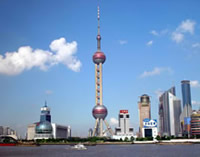|
|


ADVERTISEMENT
Buy Your own advertising
spaces!
.
Download Adobe Acrobat Reader to open [PDF] files.
Recent Visitors
Stage set for West to impress Chinese
2009. 18 December
 (english.people.com.cn)
A giant sculpture of a brain cell sits on a pedestal in the center of a green house made of glass and steel, signifying process through innovation. That is the theme of the Belgian-European Union pavilion for next year's Shanghai Expo.
(english.people.com.cn)
A giant sculpture of a brain cell sits on a pedestal in the center of a green house made of glass and steel, signifying process through innovation. That is the theme of the Belgian-European Union pavilion for next year's Shanghai Expo.
The idea is merely a sketch on paper at the moment. But come May, the 5,000-sq-m structure in the center of the expo garden will be one of some 50 pavilions representing Western nations competing for a stronger presence in the Chinese market.
"The expo will be a great chance to strengthen political, economic and cultural relationships between China and the various participants," said Marie Benassi, deputy general-commissioner of the European Union pavilion.
The six-month gala is expected to draw 70 million visitors, mainly Chinese. As such it presents an unprecedented opportunity for Western nations to persuade Chinese businessmen and women to invest in their products and services.
Access to one of the most stable economies from China's financial hub in Shanghai could not be timelier for Western countries, which are increasingly depending on deep-pocketed Chinese consumers to ease them out of the financial slump created by the global credit meltdown.
Despite the economic downturn, the world's fastest-growing economy is predicted to see over 8 percent growth this year, which puts China in position to be reaching out to foreign investments at this time, according to Hong Kong-based private investment banker Samantha Ho.
"China is coming out of the crisis much quicker than most Western countries," said Ho.
Last year, two-way trade between China and the United States reached $409 billion, while China's trade with the European Union hit $480 billion.
But Chinese imports to Western nations severely outweighed Western exports to China.
Chinese exports to the US struck $338 billion while US imports to China reached only $72 billion in 2008. Over the same period, the EU bought $364 billion worth of goods from China, but exported just $114 billion.
As Western countries seek to narrow this gap, many are looking to the Shanghai Expo as a crucial platform to promote homegrown brands to Chinese, said Benassi.
"European industries can benefit as the Chinese market is still relatively closed to foreign products and services," she added.
Similar sentiments were echoed by some 40-plus Western companies surveyed last month by China Daily. Respondents said zeroing in on Chinese clientele would be their top priority.
As one of the first foreign automakers to enter the Chinese market in 1984, Volkswagen is said to have more to gain from the recovery period than its competitors in China.
In fact, the German company expects to sell 1.4 million cars to Chinese by the end of 2009, to surpass its record-breaking 1 million sold on the mainland in 2008. Volkswagen added that it is banking on the expo to further boost Chinese sales and continue recovery into next year.
When the expo opens, the car producer will launch new concept cars highlighting sustainable mobility.
"The expo will give new impulses to the automobile industry and will help to advertise new technologies, such as electric cars," said Peter Thul, a senior executive at Volkswagen.
American carmaker General Motors is acting on the same assumption.
"The expo is a great opportunity to influence consumers, government officials, and policy makers, and to contact consumers, dealers and media," said GM's spokesperson Karin Zhang. The company is partnering with the Shanghai Automotive Industry Corporation (SAIC) to promote its brand at the expo.
Competitive edge
Meanwhile, following a strong campaign at the Beijing Games, American soft drink giant Coca-Cola, which holds half of the Chinese soft drink market, is counting on the expo to fend off rival competitor Pepsi, which is creeping up with a 30-percent share of the Chinese market.
"Expo 2010 will be another key milestone for us in stimulating our business and successfully achieving our goals in the Chinese market," said Stefanie Danne, a spokesperson for The Coca-Cola Company, for which China is its fourth-largest market.
"We want to create a strong connection with Chinese customers."
While experts say benefits from the expo will cross industries, the biggest handout will go to the struggling airline sector, one of the hardest-hit last year. It was already reeling from soaring fuel prices prior to the credit crunch before the worldwide spread of the infectious H1N1 virus compounded industry challenges.
With an estimated 66 million domestic travelers and 4 million overseas visitors touching down in the city next year, airlines like Germany's Lufthansa hope to build customer loyalty.
"We will take this opportunity to show customers coming to China the high quality of our services," said Frank Pttmann, director of corporate communications at Lufthansa.
All of this increased exposure to the Chinese market, if approached smartly, will only fuel momentum for Western companies in China, now and in the future, said Ho.
"(It) is a chance for them to learn about Chinese consumers, to understand the needs, demands and culture (and) to feel the energy and strong growth in China's market so they can figure out ideas on how to best participate," she added.
Source: english.people.com.cn


